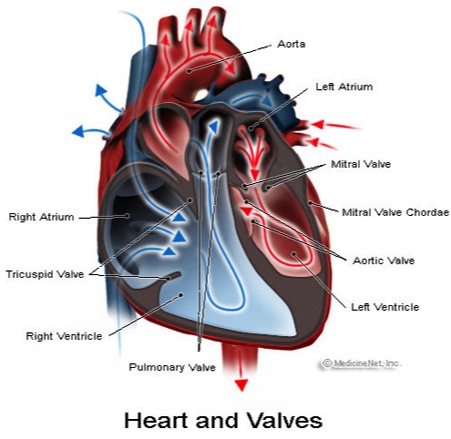According to the American Heart Association, about 5 million Americans are diagnosed with valvular heart disease each year. Valvular heart disease is caused by stenosis, or abnormal narrowing of the cardiac valves, causing obstructed blood flow and blood regurgitation. In essence, the valves just don’t work as they are intended.
What Are the Types of Valve Disease?
There are several types of valvular heart disease, to include:
Valvular stenosis: When a valve opening is smaller than normal leading to heart failure.
Valvular Insufficiency: occurs when a valve does not close tightly, thus allowing blood to leak backwards.
What Causes Valvular Disease?
Valvular disease can be congenital or acquired sometime during life. Leaflets can be the wrong size, malformed, or are not connected to the annulus properly.
Bicuspid aortic valve disease is a congenital valve disease of the aortic valve. Instead of the normal three leaflets the bicuspid aortic valve has only two. The valve may be unable to open or close properly, or not able close tightly.
Acquired valve disease is when valves that were once normal, are now abnormal. These may due to a variety of diseases or infections, including rheumatic fever or endocarditis.
Mitral valve prolapse (MVP) is a very common, rarely causes symptoms, and usually doesn’t require treatment.
What Are the Types of Valve Disease?
There are several types of valvular heart disease, to include:
Valvular stenosis: When a valve opening is smaller than normal leading to heart failure.
Valvular Insufficiency: occurs when a valve does not close tightly, thus allowing blood to leak backwards.
What Causes Valvular Disease?
Valvular disease can be congenital or acquired sometime during life. Leaflets can be the wrong size, malformed, or are not connected to the annulus properly.
Bicuspid aortic valve disease is a congenital valve disease of the aortic valve. Instead of the normal three leaflets the bicuspid aortic valve has only two. The valve may be unable to open or close properly, or not able close tightly.
Acquired valve disease is when valves that were once normal, are now abnormal. These may due to a variety of diseases or infections, including rheumatic fever or endocarditis.
Mitral valve prolapse (MVP) is a very common, rarely causes symptoms, and usually doesn’t require treatment.
Other Causes:
heart attack
cardiomyopathy
syphilis
high blood pressure
aortic aneurysms
connective tissue diseases
Symptoms:
Shortness of breath
Weakness or dizziness
chest discomfort
heart palpations
edema
rapid weight gain
heart attack
cardiomyopathy
syphilis
high blood pressure
aortic aneurysms
connective tissue diseases
Symptoms:
Shortness of breath
Weakness or dizziness
chest discomfort
heart palpations
edema
rapid weight gain
Diagnosis:
Echocardiography
Transesophageal echocardiography
Cardiac catheterization (also called an angiogram)
Radionuclide scans
Magnetic resonance imaging (MRI)
Treatment involves protecting your valve from further damage, lessening symptoms, and repairing or replacing valves.
Medications:
Diuretics
Anti-arrhythmics
Vasodilators
Beta Blockers
Blood thinners
Echocardiography
Transesophageal echocardiography
Cardiac catheterization (also called an angiogram)
Radionuclide scans
Magnetic resonance imaging (MRI)
Treatment involves protecting your valve from further damage, lessening symptoms, and repairing or replacing valves.
Medications:
Diuretics
Anti-arrhythmics
Vasodilators
Beta Blockers
Blood thinners

Protecting Yourself:
If you have valvular disease it is important to protect yourself against infection by taking care of your teeth and gums and taking antibiotics before undergoing any type of procedure that may cause bleeding. Make sure that all your doctors know you have valvular disease, and take all your medications to control any symptoms.
Content Resource: http://www.clivir.com/lessons/show/valvular-heart-disease.html
If you have valvular disease it is important to protect yourself against infection by taking care of your teeth and gums and taking antibiotics before undergoing any type of procedure that may cause bleeding. Make sure that all your doctors know you have valvular disease, and take all your medications to control any symptoms.
Content Resource: http://www.clivir.com/lessons/show/valvular-heart-disease.html
Cardiac Specialty Care
• Structural Heart Disease
• TAVR
• CardioMEMS (Heart Failure)
• PFO Closure
• TAVR
• CardioMEMS (Heart Failure)
• PFO Closure
• Coronary Intervention
• Complex Higher-Risk (And Indicated) Patients (CHIP) Angioplasty
• Atherectomy
• Impella and ECMO Support
• Complex Higher-Risk (And Indicated) Patients (CHIP) Angioplasty
• Atherectomy
• Impella and ECMO Support
• Peripheral Angioplasty
• Varicose Vein Treatment (Venous Ablation)
• DVT thrombectomy - IVC filter
• Carotid Stenting
• Varicose Vein Treatment (Venous Ablation)
• DVT thrombectomy - IVC filter
• Carotid Stenting
• Rhythm Management
• Pacemaker
• Holter Monitoring
• Exercise Stress Test
• Echocardiography
• Nuclear Stress Test
• Enhanced External Counterpulsation (EECP)
• Pacemaker
• Holter Monitoring
• Exercise Stress Test
• Echocardiography
• Nuclear Stress Test
• Enhanced External Counterpulsation (EECP)
